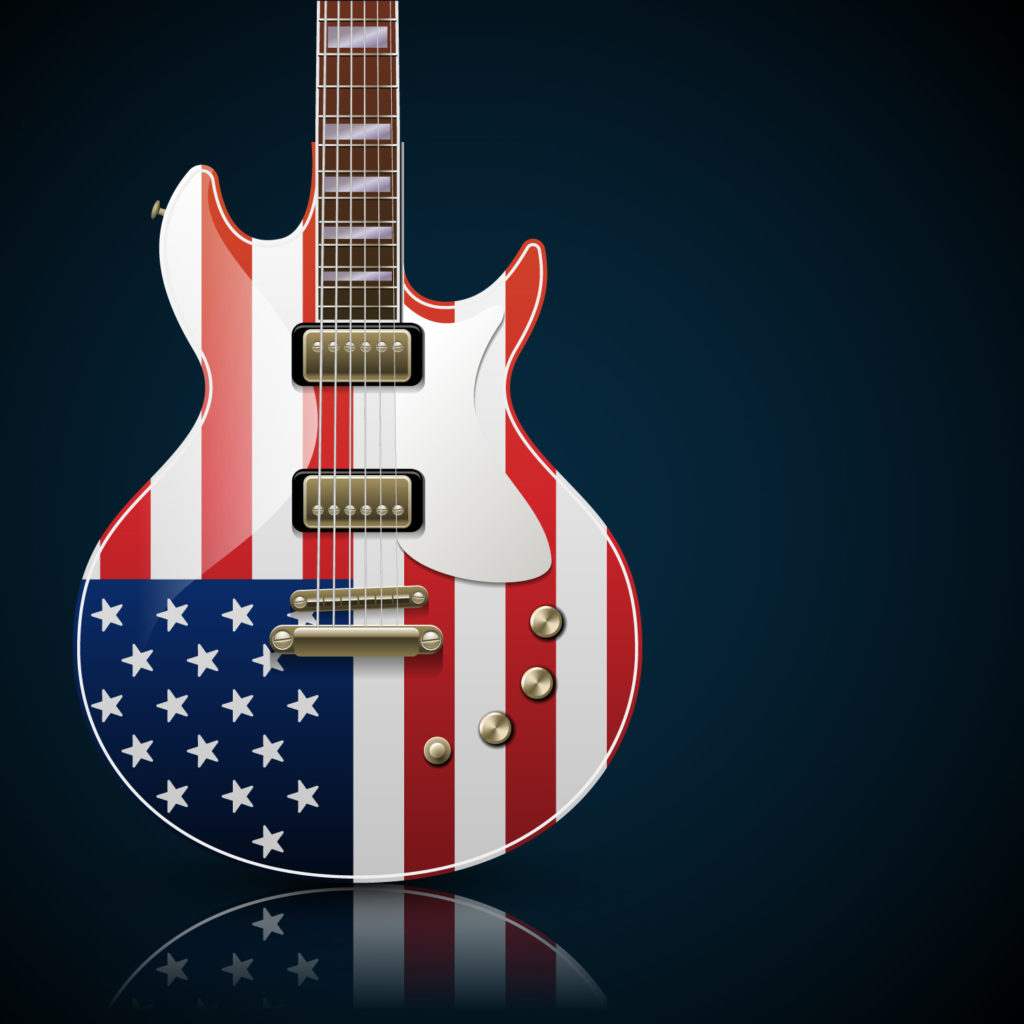British vs. American Rock: Is There A Difference?
Artists have dominated the Rock music genre from either side of the Atlantic divide between the United States and The United Kingdom. But is there a difference between British Rock and American Rock?
American Rock and British Rock have always had their fates intertwined, and there are a few noticeable differences between the two. Still, other than the artist’s origins, no strictly definable characteristics separate the two.
Artists that have almost entirely shaped the evolution of Rock music as a whole are from the two biggest English-speaking nations on earth, the US and the UK. And, while artists like The Beatles achieved unprecedented success courtesy of the influential role of Elvis Pressley’s early iterations of Rock ‘n Roll in the 50s, legends of the genre to emerge in the US after The Beatles, like Kiss and Nirvana, may not have made their music without the British pioneers – who remain the highest selling band of all time, bar none.
The Intertwined Fates of British & American Rock
Rock music was born in the United States in the 1950s, combining Blues, Gospel, Jazz, and Country music, with artists such as Muddy Watters, Elvis Pressley, Chuck Berry, Buddy Holly, and Little Richard spearheading the movement in the post-war era.
In the 1960s, the “British invasion”, where The Beatles, The Rolling Stones, The Who, and several others dominated the charts, cemented the UK as the birthplace of some of the most influential musicians of all time. Meanwhile, American Rock stars, like Jimi Hendrix, would continue to wow audiences with their own unique styles that offered something slightly different to music fans.
Later, throughout best-selling the 1970s to the present day, Rock artists have made a name for themselves and etched their names into musical folklore, emerging from both countries. Their varying success seems to be defined by a cultural divide more than by their music itself. Perhaps the best observation you could make is that solo artists seem to be far more popular in the US, while bands appear to dominate the scene in the UK.
Solo Artists vs. Bands
One noticeable difference between British and American Rock music is that solo artists seem to be far more successful in the United States. In contrast, Rock bands seem to achieve higher levels of success in Britain.
If you take a look at the top 20 highest selling artists of all time, you’ll notice that the list is perfectly split between bands and solo acts:
Top 25 Selling Artists of All Time:
| Artist | Band/Solo | Origin |
| The Beatles | Band | British |
| Michael Jackson | Solo | American |
| Madonna | Solo | American |
| Led Zeppelin | Band | British |
| Elton John | Solo | British |
| Pink Floyd | Band | British |
| Mariah Carey | Solo | American |
| Celine Dio | Solo | Canadian |
| AC/DC | Band | Australian |
| Whitney Houston | Solo | American |
| The Rolling Stones | Band | British |
| Queen | Band | British |
| ABBA | Band | Swedish |
| The Eagles | Band | American |
| U2 | Band | Irish |
| Billy Joel | Solo | American |
| Phil Collins | Solo | British |
| Aerosmith | Band | American |
| Frank Sinatra | Solo | American |
| Barbra Streisand | Solo | American |
You will notice that eight are from North America out of the ten solo artists, while eight of the ten best-selling bands are from outside of America. So, just like Rock music itself isn’t necessarily defined by a particular style, outside of a general affinity towards the electric guitar and its ties youth counter-culture, the difference between British and American Rock appears to be delineated on a cultural basis more than by the individual artists’ specific styles.

American Individualism vs. The British Collective
The distinct, yet inexplicably convoluted, British Rock and American Rock have two different musical outputs, and the evolution of some individual artists can explain this.
Both The Rolling Stones and Led Zeppelin have stated that their music would not have evolved into the iconic styles they took on without incorporating American rhythm and blues. At the same time, the song lists on The Beatles’ legendary tours around the UK that famously helped them perfect their style frequently Elvisincluded Chuck Berry covers.
Other examples of bands from the US, such as The White Stripes, Kings of Leon, The Strokes, and several others, had to cut their teeth in the UK before achieving commercial success in their homeland.
So, where does this come from? Some Rock historians argue that it is grounded in political and social values, particularly considering some Rock artists’ backgrounds. American audiences tend to show a preference towards solo artists because of the importance of individualism and The American Dream – one need only look at the “rags to riches” stories of Elvis Pressley, Michael Jackson, and many Hip-Hop artists that have dominated the charts for well over a decade, to see the cultural appeal of solo performers.
American bands would always have a distinct frontman in the early days of Rock ‘n Roll, eg. The Jimi Hendrix Experience. Even The Supremes changed their name to Diana Ross & The Supremes in the 60s to exemplify how American audiences have come to identify with individual performers.
On the East side of the Atlantic, however, The Beatles couldn’t decide Elvis, who would be the band’s frontman, and the same can be said for Pink Floyd after Syd Barrett left the band. So they presented themselves as a collective. When The Beatles landed in America for the first time, they were rocking identical hairstyles and suits, all equal parts of the group that would be affectionately known as the “Fab Four”. Pink Floyd went from being a group focused on selling singles under the individual creative inputs from Syd Barret, while Roger Waters and David Gilmour would have their own distinct era as the band’s so-called frontman.
Many British artists also don’t have the same humble beginnings, and artists like Phil Collins and Elton John had honed their skills through a musical education before emerging as bona fide icons. So, while Americans have a propensity for individualism, it seems that British audiences gravitate towards a more European value of collectivism, with multiple creative inputs collaborating in the composition of their Rock music.
British Rock & American Rock Aren’t So Different After All
Now, while you may say that American Rock and British Rock are separated by their cultural values of individualism and collectivism, they have far more in common in that they define what Rock music is all about: Youth counter-culture, rebelliousness, and the unique ability to get audiences off of their feet and singing along to a creatively composed masterpiece. It just so happens that American audiences better appreciate the individual creative input while British music fans tend to gravitate towards collaborative works.
So if you want to know the difference between British and American Rock, the answer is that there is no real difference, in musical terms – except for how artists made the music and the creative process it went through before fans heard the tracks for the first time; it’s intangible, and there’s nothing specific.
But for every David Bowie, there is a Bob Dylan, for every Elvis Pressley, there’s a Cliff Richard, and where would The Ramones be if not for the profound influence that Sex Pistols had on the evolution of Punk Rock? There is no formula for what is American Rock and what is British Rock, it’s a descriptor for where the artist comes from, and the difference is in the people they appeal to.








